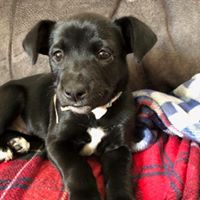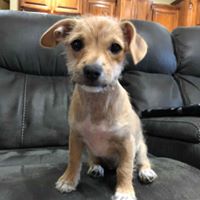Humane Society of Lawton-Comanche County
Puppy Care Tips
|
Tips for a Safe, Happy, Well-Behaved Puppy
Before adopting a new puppy, keep in mind these tips to help prepare you, your family and your home for the new arrival. At Home
Children and pets
Special puppy concerns
The Puppy’s Rule of 12
By the time a puppy is 12 weeks old it should have done as much of the following as possible. Be sure that your puppy has completed all vaccinations before allowing your puppy to go into public areas such as parks and other areas that may have grass or dirt. Parvo is a deadly virus and is the number one killer of puppies in the Lawton area. Be sure your puppy is fully vaccinated to protect him from this deadly disease. Consult your veterinarian for further information. The Rules of 12
A young puppy has so much potential and starting off from scratch means you have the opportunity to make impressions on them that will last for the rest of their life. Your dog’s early experiences will shape their personality, how they see the world around them, and how they are able to deal with stress. A well thought out socialization plan can help you raise a dog that you can take anywhere with anyone with a happy wag of the tail. Poor socialization can leave you with a fearful, reactive dog that can’t cope with being outside of their home environment. Give your puppy the best possible start by making sure they have early, safe, and POSITIVE experiences with a variety of people, places, surfaces, sounds, and temperatures. Never force your pup to approach anyone or anything, let them explore on their own terms. Always make sure to quietly praise and encourage them when they boldly approach things on their own. When your puppy seems uncertain, allow them to proceed at their own pace or to move away from that which worries them. Then encourage them to approach at their own pace again. For example, have a “scary” person kneel down to the side and not look at the puppy while holding out a treat for them. Keep in mind that you’re not trying to overwhelm your puppy with new experiences – quantity is not better than quality. Make sure your puppy is confident, well rested, and having a good time whenever you introduce them to something new. Don’t overdo it either. Puppies get tired very quickly. Most importantly, make sure to give your puppy lots of downtime after a new experience to recuperate and rest in a safe and quiet place. Nipping and Mouthing All puppies normally use their mouth to explore their environment, to initiate play, during play, to indicate displeasure, and to defend themselves from frightening things. Puppies need to learn bite inhibition. That is, they need to learn to control the strength of their jaws, and learn not to use their mouth on people (but if they ever do, they should do it softly). If they nip to invite you to play, accidentally during play, or when they are just exploring their world:
Exposure to Other Animals Puppies don’t have their full immune system prepared until later in life, so do NOT take them to dog parks or allow them to meet an unknown dog. However, it is good for puppies to meet a socially appropriate, healthy adult dog (your own dog or a friend/neighbor’s dog should be okay). Always supervise this interaction and if the puppy is not enjoying it, or the adult dog is not patient and tolerant, separate the dogs immediately. Puppies can benefit from living with, or being exposed to cats/kittens at a very young age as well. PROVIDE TOYS. A variety of toys that are rotated for something new each day: ball, hard plastic toys, soft toys, squeaky toys, etc. Be sure the toys are hardy and do not present a choking hazard with any loose pieces that can be bitten off. Housetraining Basics In order to housetrain a puppy, follow these guidelines:
|





